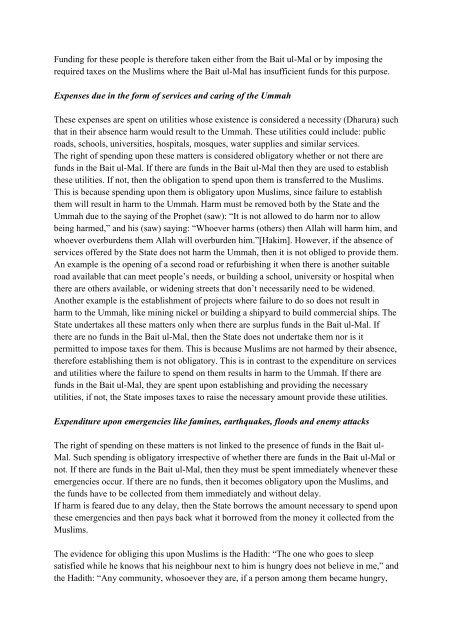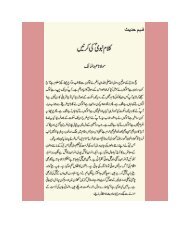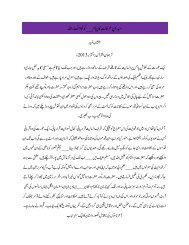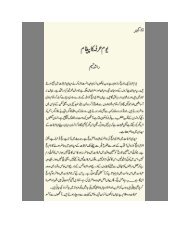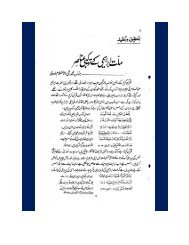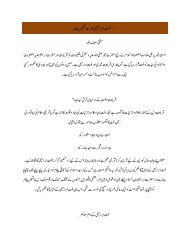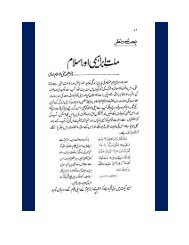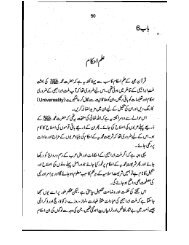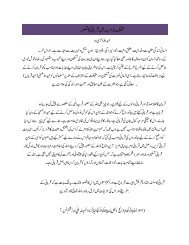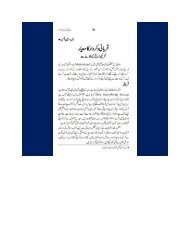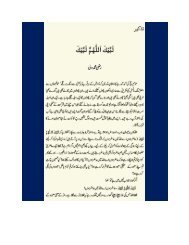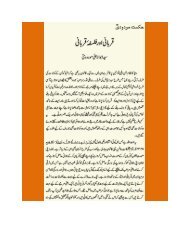Islam_Tax
Create successful ePaper yourself
Turn your PDF publications into a flip-book with our unique Google optimized e-Paper software.
Funding for these people is therefore taken either from the Bait ul-Mal or by imposing the<br />
required taxes on the Muslims where the Bait ul-Mal has insufficient funds for this purpose.<br />
Expenses due in the form of services and caring of the Ummah<br />
These expenses are spent on utilities whose existence is considered a necessity (Dharura) such<br />
that in their absence harm would result to the Ummah. These utilities could include: public<br />
roads, schools, universities, hospitals, mosques, water supplies and similar services.<br />
The right of spending upon these matters is considered obligatory whether or not there are<br />
funds in the Bait ul-Mal. If there are funds in the Bait ul-Mal then they are used to establish<br />
these utilities. If not, then the obligation to spend upon them is transferred to the Muslims.<br />
This is because spending upon them is obligatory upon Muslims, since failure to establish<br />
them will result in harm to the Ummah. Harm must be removed both by the State and the<br />
Ummah due to the saying of the Prophet (saw): “It is not allowed to do harm nor to allow<br />
being harmed,” and his (saw) saying: “Whoever harms (others) then Allah will harm him, and<br />
whoever overburdens them Allah will overburden him.”[Hakim]. However, if the absence of<br />
services offered by the State does not harm the Ummah, then it is not obliged to provide them.<br />
An example is the opening of a second road or refurbishing it when there is another suitable<br />
road available that can meet people’s needs, or building a school, university or hospital when<br />
there are others available, or widening streets that don’t necessarily need to be widened.<br />
Another example is the establishment of projects where failure to do so does not result in<br />
harm to the Ummah, like mining nickel or building a shipyard to build commercial ships. The<br />
State undertakes all these matters only when there are surplus funds in the Bait ul-Mal. If<br />
there are no funds in the Bait ul-Mal, then the State does not undertake them nor is it<br />
permitted to impose taxes for them. This is because Muslims are not harmed by their absence,<br />
therefore establishing them is not obligatory. This is in contrast to the expenditure on services<br />
and utilities where the failure to spend on them results in harm to the Ummah. If there are<br />
funds in the Bait ul-Mal, they are spent upon establishing and providing the necessary<br />
utilities, if not, the State imposes taxes to raise the necessary amount provide these utilities.<br />
Expenditure upon emergencies like famines, earthquakes, floods and enemy attacks<br />
The right of spending on these matters is not linked to the presence of funds in the Bait ul-<br />
Mal. Such spending is obligatory irrespective of whether there are funds in the Bait ul-Mal or<br />
not. If there are funds in the Bait ul-Mal, then they must be spent immediately whenever these<br />
emergencies occur. If there are no funds, then it becomes obligatory upon the Muslims, and<br />
the funds have to be collected from them immediately and without delay.<br />
If harm is feared due to any delay, then the State borrows the amount necessary to spend upon<br />
these emergencies and then pays back what it borrowed from the money it collected from the<br />
Muslims.<br />
The evidence for obliging this upon Muslims is the Hadith: “The one who goes to sleep<br />
satisfied while he knows that his neighbour next to him is hungry does not believe in me,” and<br />
the Hadith: “Any community, whosoever they are, if a person among them became hungry,


